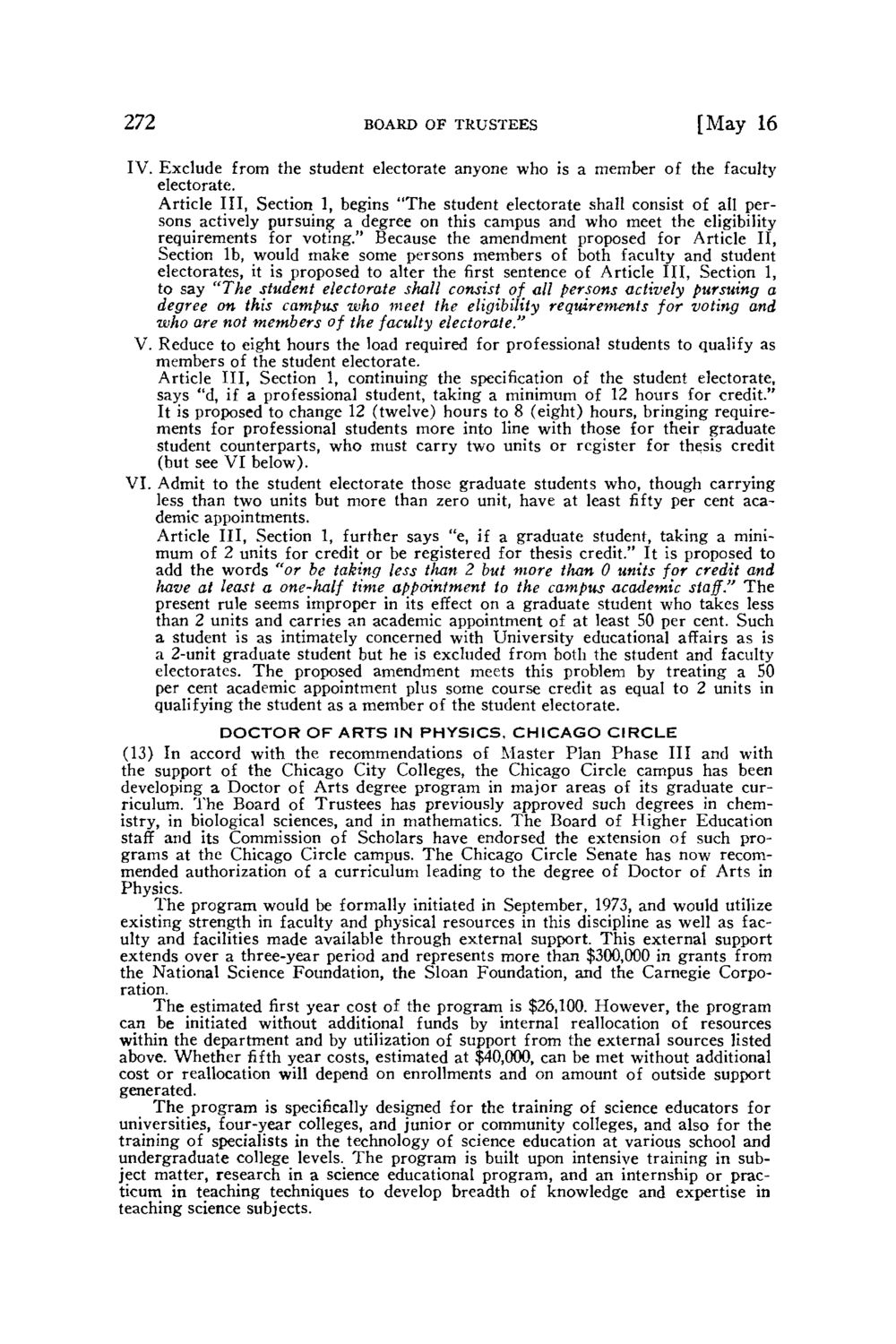| |
| |
Caption: Board of Trustees Minutes - 1974 Version B
This is a reduced-resolution page image for fast online browsing.

EXTRACTED TEXT FROM PAGE:
272 BOARD OF TRUSTEES [May 16 IV. Exclude from the student electorate anyone who is a member of the faculty electorate. Article I I I , Section 1, begins "The student electorate shall consist of all persons actively pursuing a degree on this campus and who meet the eligibility requirements for voting." Because the amendment proposed for Article II, Section lb, would make some persons members of both faculty and student electorates, it is proposed to alter the first sentence of Article I I I , Section 1, to say "The student electorate shall consist of all persons actively pursuing a degree on this campus who meet the eligibility requirements for voting and who are not members of the faculty electorate." V. Reduce to eight hours the load required for professional students to qualify as members of the student electorate. Article I I I , Section 1, continuing the specification of the student electorate, says "d, if a professional student, taking a minimum of 12 hours for credit." It is proposed to change 12 (twelve) hours to 8 (eight) hours, bringing requirements for professional students more into line with those for their graduate student counterparts, who must carry two units or register for thesis credit (but see V I below). VI. Admit to the student electorate those graduate students who, though carrying less than two units but more than zero unit, have at least fifty per cent academic appointments. Article I I I , Section 1, further says "e, if a graduate student, taking a minimum of 2 units for credit or be registered for thesis credit." It is proposed to add the words "or be taking less than 2 but more than 0 units for credit and have at least a one-half time appointment to the campus academic staff." T h e present rule seems improper in its effect on a graduate student who takes less than 2 units and carries an academic appointment of at least 50 per cent. Such a student is as intimately concerned with University educational affairs as is a 2-unit graduate student but he is excluded from both the student and faculty electorates. T h e proposed amendment meets this problem by treating a SO per cent academic appointment plus some course credit as equal to 2 units in qualifying the student as a member of the student electorate. DOCTOR OF ARTS IN PHYSICS, CHICAGO CIRCLE (13) In accord with the recommendations of Master Plan Phase I I I and with the support of the Chicago City Colleges, the Chicago Circle campus has been developing a Doctor of Arts degree program in major areas of its graduate curriculum. The Board of Trustees has previously approved such degrees in chemistry, in biological sciences, and in mathematics. The Board of Higher Education staff and its Commission of Scholars have endorsed the extension of such programs at the Chicago Circle campus. The Chicago Circle Senate has now recommended authorization of a curriculum leading to the degree of Doctor of Arts in Physics. The program would be formally initiated in September, 1973, and would utilize existing strength in faculty and physical resources in this discipline as well as faculty and facilities made available through external support. This external support extends over a three-year period and represents more than $300,000 in grants from the National Science Foundation, the Sloan Foundation, and the Carnegie Corporation. T h e estimated first year cost of the program is $26,100. However, the program can be initiated without additional funds by internal reallocation of resources within the department and by utilization of support from the external sources listed above. Whether fifth year costs, estimated at $40,000, can be met without additional cost or reallocation will depend on enrollments and on amount of outside support generated. The program is specifically designed for the training of science educators for universities, four-year colleges, and junior or community colleges, and also for the training of specialists in the technology of science education at various school and undergraduate college levels. The program is built upon intensive training in subject matter, research in a science educational program, and an internship or practicum in teaching techniques to develop breadth of knowledge and expertise in teaching science subjects.
| |